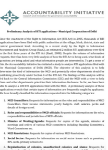
The Right to (Right) Information
22 March 2013
I attended the Fourth National Right to Information (RTI) Convention in Hyderabad, organized by the National Campaign for People’s Right to Information (NCPRI) on the 17th and 18th of February, 2013. In the midst of RTI legends, Nikhil Dey and Aruna Roy, were a large number of supporters that included social scientists, professors, government officials, and community workers. Several other genuinely-interested citizens, most of whom have used the RTI to avail public information, were also present. The Convention, in essence, was an initiative to encourage a conversation on the multiple facets around transparency, as well as help shape the priorities of the NCPRI in terms of what their focus areas for the next two years should be.
Having arrived at the end of the second day of the Convention, my colleague and I were greeted by the sounds of a mixture of folk and narrative songs (an exploration of field experiences with corrupt officials or on the positive impact of the power of information). This was indeed a unique start when compared to the conferences I have attended in the recent past This, in addition to the great conversation and networking at dinner was followed by a casual request to facilitate a workshop on ‘RTI and Youth’ the following day.
The third day of the Convention was divided between a session looking back at resolutions decided at the previous National Convention held by NCPRI in Shillong in 2011(available here), and the 15 Workshops organized under the umbrella term of ‘From Transparency to Accountability’. These workshops were centered around issues that included: Unique Identification (UID) and privacy, human rights in conflict areas, RTI and Media, RTI and basic services, Information Commissions, Proactive Disclosure on Section 4, RTI and natural resources, Social Audit , Electoral Transparency, RTI and PPP’s and the Future of RTI. The fourth day was given to a public announcement of the Hyderabad Declaration based on these Workshops and a Social Audit field experience near Hyderabad. By focusing on citizen engagement, this Convention was a great platform for several civil society members to talk about their initiatives and work, as well as to represent a small sliver of practitioners who use or want to use the RTI as a platform to monitor government processes.
The group of (approximately) 300 people, were given the freedom of attending any workshop of their choice amongst the ones noted above. While facilitating the ‘RTI and Youth Workshop’, some of the important themes that are relevant to all RTI applicants are listed below:
More RTI applications filed may not necessarily mean more information
According to Central Information Commissions Annual Report 2011-12 (see here), the number of requests received have increased from 3.62 lakh in 2008-09 to 7.05 lakh in 2011-12. This incredible increase is, however, paralleled by a jump in the number of requests rejected, from 23,954 applications in 2008-09 to 52,313 applications in 2011-12. The group gave supplementary anecdotal evidence that, in effect, questioned whether the documents received by the applicants are even relevant to what they had asked in their application. In other situations, the particular department may not even have the documents in their record or any systematic means to retrieve them- this poses a serious question on the management of data.
Access to information on the RTI may be disconnected
It is also important to add that there are information gaps on how to file and which department to file the application to, in both urban and rural areas. Who are the points of contact and how can this process be streamlined? These are important areas to identify and demystify to strengthen the RTI–user base. For the youth in college, it was suggested that RTI Forums and Clubs be formed to engage youth in constant debate. This would also help in leveraging the experiences of organizations involved in such work (as well as individuals) through a network format. In a way, that is what RTI Warriors[1] are doing through the social media.
Safeguards on paper may still lead to victimization
An interesting game during our workshop led to one topic standing out more than the others – What is the difference between an ‘RTI activist’ and everyone else? Is there a difference? Aside from me and one other person, the rest of the group really believed that there is indeed a separation. This, I believe, personifies the inherent concerns with regard to how information is accessed, who accesses it and finally, what are the effects on the person filing the RTI. Surprisingly, this view came from people who were RTI practitioners themselves or had a thorough understanding of its strengths.
This leads me to think that there is something missing in how we are approaching the RTI movement. On paper, we are all equal stakeholders. However, the level of discontent/threats/intimidation that RTI applicant’s may face when seeking particular information leads to a distinct form of victimization that may be a result of having lack of organized support and motivation from peers. Several instances were discussed wherein applicants have been sent to jail on multiple claims by politicians in power. This not only gives a picture of how protected one’s personal information is, but is also telling of how confidence in legal procedures can be broken in the minds of applicants. An interesting online forum has recently come up – the RTI Anonymous Movement (link here) tries to surpass this loop of threats. Essentially, it files RTI’s anonymously on behalf of those who do not want to give their personal information.
Conclusion
This Convention provided a space that allowed civil society members to coalesce, where the open discussion and debate on topics have left me nothing but impressed. A type of a back-to-basics approach in the active exercise of citizen participation when approaching such issues is indeed useful, and should be encouraged. For NCPRI, this is placed at the heart of their movement towards good governance and accountability.
[1] http://www.facebook.com/groups/179780035370908/?fref=ts





